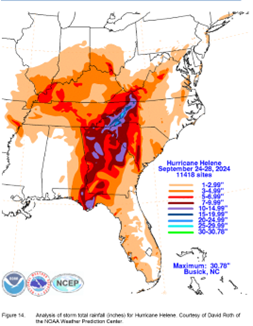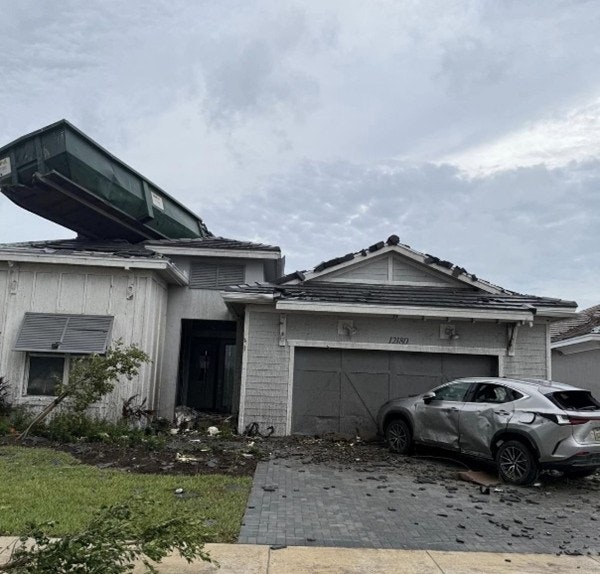Prepare for Storm Season Now
As much as we dislike talking about it, hurricane season officially started on June 1st. Hurricane season isn't a race. No bells chime to begin the onslaught of storms forming in the oceans surrounding North America. June 1st marks the beginning of the period when most tropical storms and hurricanes typically form. The six-month period from June 1st to November 30th accounts for about 97% of all Atlantic tropical cyclone activity. While storms can and do occur outside of this period, the peak of the season is typically between mid-August and mid-October, with the most activity happening then.
Last year's storms proved that storms do not always resemble "typical" hurricanes. While there was plenty of high wind and rain, we also experienced huge rain events and tornadoes hundreds of miles away from the storms' centers. Hurricane Helene made landfall in the Big Bend area of northern Florida. It traveled northeast through Georgia, North and South Carolina, and even into Tennessee and Virginia. It dumped over 30 inches of rain in the mountains of North Carolina, 20 inches in Greenville, South Carolina, and 15 inches in parts of Georgia and Florida. Portions of Asheville and Chimney Rock, North Carolina, were washed away.

Hurricane Milton made landfall near Siesta Key on the west coast of Florida as a category three hurricane. Milton approached Florida as an extremely dangerous category five hurricane before encountering increasing wind shear. Despite the wind shear weakening the storm, Milton's wind field expanded as it approached the Florida Peninsula, extending impacts far and away from the storm's center. Impacts to our area in the east-central part of Florida were significant, including a tornado outbreak that produced 15 confirmed tornadoes, including two EF3s, a first in 30 years, and hurricane-force wind gusts that downed trees and power lines. Many homes and businesses were damaged in Wellington, Palm Beach Gardens, the Acreage, and Ft. Pierce. The Wellington/LoxahatcheeGroves/TheAcreage/PalmBeachGardens/JupiterFarms tornado, as documented by the National Weather Service, traveled almost 30 miles in 30 minutes and was categorized at an EF2 that strengthened into an EF3 with winds peaking around 140 mph.

The National Weather Service and National Hurricane Center are rethinking how hurricanes and their impacts are predicted. A new model will predict the potential storm path and impacts outside of that path.
The key to staying safe is to be prepared:
- Know Your Hurricane Risk—Hurricanes are not just a coastal problem. As we saw from Hurricane Milton, their effects can be felt hundreds of miles away.
- Make an Emergency Plan- Ensure everyone in your household knows and understands your hurricane plans.
- Know your Evacuation Zone—If you live in an evacuation zone, you may have to evacuate quickly due to a hurricane. You only need to evacuate 20-30 miles away. This could mean moving just further inland rather than traveling north or south.
- Recognize Warnings and Alerts—There are several ways to receive alerts. Download a weather app or have a weather radio tuned to the local area frequency.
- Those with Disabilities- Identify if you need additional help during an emergency if you or anyone else in your household is an individual with a disability. Register with the special needs shelter in your area early if you or someone you know will need electrically energized life support equipment. Pre-registration is required.
- Review Important Documents- Ensure your insurance policies and personal documents are current. Make copies or take pictures and keep them in a secure password-protected digital space.
- Strengthen your Home- Declutter drains and gutters, bring in outside furniture, and consider hurricane shutters.
- Get Tech Ready- Keep your cell phone charged when a hurricane or tropical storm warning is issued, and purchase backup charging devices to power electronics.
- Help your Neighborhood- Check with neighbors, senior adults, or those who may need additional help securing hurricane plans to see how you can be of assistance to others
- Gather Supplies—Have enough household supplies, including medication, disinfectant and pet supplies, in your go bag or car trunk. You may not have access to these supplies for days or even weeks after a hurricane. Also, have cash on hand since the power to payment devices and banks could be out for an extended time.
Don't wait- prepare today. "By failing to prepare, you're preparing to fail"- Benjamin Franklin.
